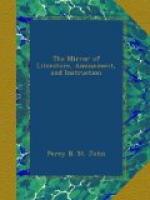An immense quantity of box is annually consumed in this country, in the revived art of engraving on wood. The English is esteemed inferior to that which comes from the Levant; and the American box is said to be preferable to ours. But the ships from the Levant brought such quantities of it in ballast, that the wood on Box Hill could not find a purchaser, and not having been cut for sixty-five years, was growing cankered. The war diminished the influx from the Mediterranean; several purchasers offered; and in 1795 it was put up to auction at 12,000_l_. The depredations made on Box Hill, in consequence of this sale, did not injure its picturesque beauty, as twelve years were allowed for cutting, which gave each portion a reasonable time to renew. In 1802, forty tons were cut, but the market being overstocked, it fell in value more than fifty per cent.; and the foreign wood is now universally preferred for engravings. The trees on Box Hill are, however, again flourishing, although their value is rather problematical.
For the information of the home tourist, perhaps, I ought to mention that Box Hill stands about 22 miles on the left of the road from London to Worthing, Brighton, and Bognor, and about 2 miles N.E. of the town of Dorking. The road from Leatherhead hence is a constant succession of hill and dale, richly clothed with wood, interspersed with elegant villas in all tastes—from the pillared and plastered mansion, to the borrowed charm of the cottage orne. The whole of this district is called the Vale of Norbury, from the romantic domain of that name, which extends over a great portion of the hills on the right of the road. Shortly before you reach Box Hill, stands Mickleham, a little village with an ivy-mantled church, rich in Saxon architecture and other antiquities. You then descend into a valley, passing some delightful meadow scenery, and the showy mansion of Sir Lucas Pepys, which rises from a flourishing plantation on the left. In the valley stands Juniper Hall, late the seat of Mr. Thomas Broadwood, the piano-forte manufacturer. In the park are some of the finest cedars in England. On again ascending, you catch a fine view of Box Hill, and the amphitheatrical range of opposite hills, with one of the most magnificent parterres in nature. This is called, by old writers, the Garden of Surrey.
You pass some flint-built cottages, and quitting the road here, the ascent to Box Hill is gradual and untiring, across a field of little slopes, studded with a few yew-trees, relics of by-gone days. The ascent further down the road almost amounts to a feat, assisted by the foot-worn paces in the chalky steep. Here this portion of the hill resembles an immense wall of viretum, down whose side has been poured liquid mortar. The path winds along the verge of the hill, whilst on the left is a valley or little ravine, whose sides are clothed with thick dwarfish box, intermingled with the wild and trackless luxuriance of forest scenery. Hence the road stretches away to Ashurst, the neat residence of Mr. Strahan, the King’s printer.




